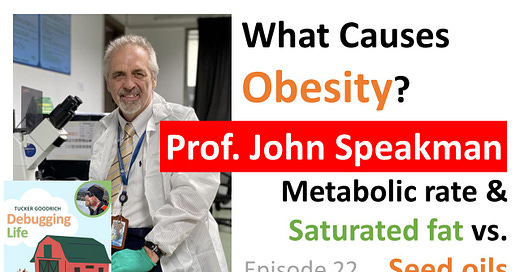Ep. 22: John Speakman—What Causes Obesity?
How a declining metabolic rate and the changing fat consumption in the world may have led to our obesity pandemic.
Introduction
I am honored to be joined by John Speakman, a leading authority on energy balance in animals, and in the use of the doubly-labeled water method of determining energy balance. This has led him into the study of obesity, among other topics, where he has become a recognized expert.
Our discussion was prompted by his recent paper, “Total Daily Energy Expenditure Has Declined Over the Past Three Decades Due to Declining Basal Expenditure, Not Reduced Activity Expenditure”, which casts a new light onto the world pandemic of obesity.
In addition to discussing a few of the papers that give some background to that one, and his future research plans in light of that paper, we have an enlightening discussion on the potential role of deuterium in obesity and chronic disease.
Podcast: https://sites.libsyn.com/408758/ep-22-john-speakmanwhat-causes-obesity .
Rumble: https://rumble.com/v4u6tnz-ep.-22-john-speakmanwhat-causes-obesity.html
For Apple and Spotify links, see below.
Biography:
“John Roger Speakman (born 1958) FRS FRSE FRSB FRSA FMedSci FRSS is a British biologist working at the University of Aberdeen, Institute of Biological and Environmental Sciences, for which he was Director from 2007 to 2011. He leads the University's Energetics Research Group, which is one of the world's leading groups using doubly labeled water (DLW) to investigate energy expenditure and balance in animals. Between 2011-2020, he was a '1000 talents' Professor at the Institute of Genetics and Developmental Biology, Chinese Academy of Sciences, in Beijing, China, where he ran the molecular energetics group. In 2020 he moved to the Shenzhen Institutes of Advanced Technology, Chinese Academy of Sciences in Shenzhen, China where he works at the Center for Energy Metabolism and Reproduction and Head of the Shenzhen Key laboratory of Metabolic Health.”
https://en.wikipedia.org/wiki/John_Speakman
_______________________________________
Looking to fix your diet by getting rid of seed oils?
Check out the Seedy app!
https://www.seedyapp.com/
Tucker Goodrich
Substack:
Twitter: https://twitter.com/TuckerGoodrich
Youtube: https://www.youtube.com/tuckergoodrich0
Apple podcast:
Spotify podcast:
Podcast: https://sites.libsyn.com/408758
Blog (deprecated, but still a lot there!):
http://yelling-stop.blogspot.com/
_______________________________________
Show Notes
Hu, S., Wang, L., Yang, D., Li, L., Togo, J., Wu, Y., Liu, Q., Li, B., Li, M., Wang, G., Zhang, X., Niu, C., Li, J., Xu, Y., Couper, E., Whittington-Davies, A., Mazidi, M., Luo, L., Wang, S., … Speakman, J. R. (2018). Dietary Fat, but Not Protein or Carbohydrate, Regulates Energy Intake and Causes Adiposity in Mice. Cell Metabolism, 28(3), 415-431.e4.
https://doi.org/10.1016/j.cmet.2018.06.010
Wu, Y., Li, B., Li, L., Mitchell, S. E., Green, C. L., D’Agostino, G., Wang, G., Wang, L., Li, M., Li, J., Niu, C., Jin, Z., Wang, A., Zheng, Y., Douglas, A., & Speakman, J. R. (2021). Very-Low-Protein Diets Lead to Reduced Food Intake and Weight Loss, Linked to Inhibition of Hypothalamic Mtor Signaling, in Mice. Cell Metabolism, 33(6), 1264–1266.
https://doi.org/10.1016/j.cmet.2021.04.016
McNay, D. E. G., & Speakman, J. R. (2013). High Fat Diet Causes Rebound Weight Gain. Molecular Metabolism, 2(2), 103–108.
https://doi.org/10.1016/j.molmet.2012.10.003
Speakman, J. R., De Jong, J. M. A., Sinha, S., Westerterp, K. R., Yamada, Y., Sagayama, H., Ainslie, P. N., Anderson, L. J., Arab, L., Bedu-Addo, K., Blanc, S., Bonomi, A. G., Bovet, P., Brage, S., Buchowski, M. S., Butte, N. F., Camps, S. G. J. A., Cooper, J. A., Cooper, R., … Wong, W. W. (2023). Total Daily Energy Expenditure Has Declined Over the Past Three Decades Due to Declining Basal Expenditure, Not Reduced Activity Expenditure. Nature Metabolism, 5(4), 579–588.
https://doi.org/10.1038/s42255-023-00782-2
Gurven, M., Kraft, T. S., Alami, S., Adrian, J. C., Linares, E. C., Cummings, D., Rodriguez, D. E., Hooper, P. L., Jaeggi, A. V., Gutierrez, R. Q., Suarez, I. M., Seabright, E., Kaplan, H., Stieglitz, J., & Trumble, B. (n.d.). Rapidly Declining Body Temperature in a Tropical Human Population. Science Advances, 6(44), eabc6599.
https://doi.org/10.1126/sciadv.abc6599
Protsiv, M., Ley, C., Lankester, J., Hastie, T., & Parsonnet, J. (2020). Decreasing Human Body Temperature in the United States Since the Industrial Revolution. eLife, 9, e49555.
https://doi.org/10.7554/eLife.49555
Linares, C., & Su, D. (2005). Body Mass Index and Health Among Union Army Veterans: 1891–1905. Economics & Human Biology, 3(3), 367–387.
https://doi.org/10.1016/j.ehb.2005.06.002
Sørensen, T. I. A., Martinez, A. R., & Jørgensen, T. S. H. (2022). Epidemiology of Obesity. In J. Eckel & K. Clément (Eds.), From Obesity to Diabetes (pp. 3–27). Springer International Publishing.
https://doi.org/10.1007/164_2022_581
Schramm, S., Sørensen, T. I. A., Davidsen, M., & Tolstrup, J. S. (2023). Changes in Adult Obesity Prevalence in Denmark, 1987–2021: Age–Period–Cohort Analysis of Nationally Representative Data. European Journal of Public Health, 33(3), 463–467.
https://doi.org/10.1093/eurpub/ckad024
Haggerty, C., Hoggard, N., Brown, D. S., Clapham, J. C., & Speakman, J. R. (2008). Intra-Specific Variation in Resting Metabolic Rate in Mf1 Mice Is Not Associated with Membrane Lipid Desaturation in the Liver. Mechanisms of Ageing and Development, 129(3), 129–137.
https://doi.org/10.1016/j.mad.2007.11.001
Zhang, L.-N., Gamo, Y., Sinclair, R., Mitchell, S. E., Morgan, D. G., Clapham, J. C., & Speakman, J. R. (2012). Effects of Chronic Oral Rimonabant Administration on Energy Budgets of Diet-Induced Obese C57BL/6 Mice. Obesity, 20(5), 954–962.
https://doi.org/10.1038/oby.2011.357
“There were four suicides in the rimonabant group (0·07%) and one in the placebo group (0·02%). The number of deaths for bariatric surgery, a widely used alternative treatment for severe obesity, would have been expected to be far greater, and in centres of excellence has been reported to be 0·3% at 90 days.2”
Topol, E. J., Bousser, M.-G., Fox, K. A., & Montelescot, G. (2010). Termination of the CRESCENDO trial – Authors’ reply. The Lancet, 376(9757), 1984–1985.
https://doi.org/10.1016/S0140-6736(10)62256-8
Else, P. L., & Hulbert, A. J. (1987). Evolution of Mammalian Endothermic Metabolism: “Leaky” Membranes as a Source of Heat. American Journal of Physiology-Regulatory, Integrative and Comparative Physiology, 253(1), R1–R7.
https://doi.org/10.1152/ajpregu.1987.253.1.R1
Speakman, J. R., Sørensen, T. I. A., Hall, K. D., & Allison, D. B. (2023). Unanswered Questions About the Causes of Obesity. Science, 381(6661), 944–946.
https://doi.org/10.1126/science.adg2718
Deuterium
Boros, L., Collins, Q., & Somlyai, G. (2018, September 24). Deuterium and Metabolic Water Matter – What This Means Biochemically and Clinically. https://www.science.org/doi/10.1126/sciadv.aat7314#elettersSection







Hi, maybe you knew about Venn study on C15 deficiency and ferroptosis? Videolink has link to the actual paper. https://youtu.be/cnTHgRJi0mM?si=hhBzIcLnZJUKnwS3
The point is, C15 makes membranes ridig and intact. What makes them vulnerable? Hint: something that peroxides... She says it but does not conclude too much.
Milk fat has C15. Advice to drink lowfat milk does not help with this deficiency.
JR
Good stuff! Found this via Hyperlipid's commentary on it here:
https://high-fat-nutrition.blogspot.com/2024/08/protons-75-tucker-speakman-astrup-and.html
And together, what a fascinating discussion!